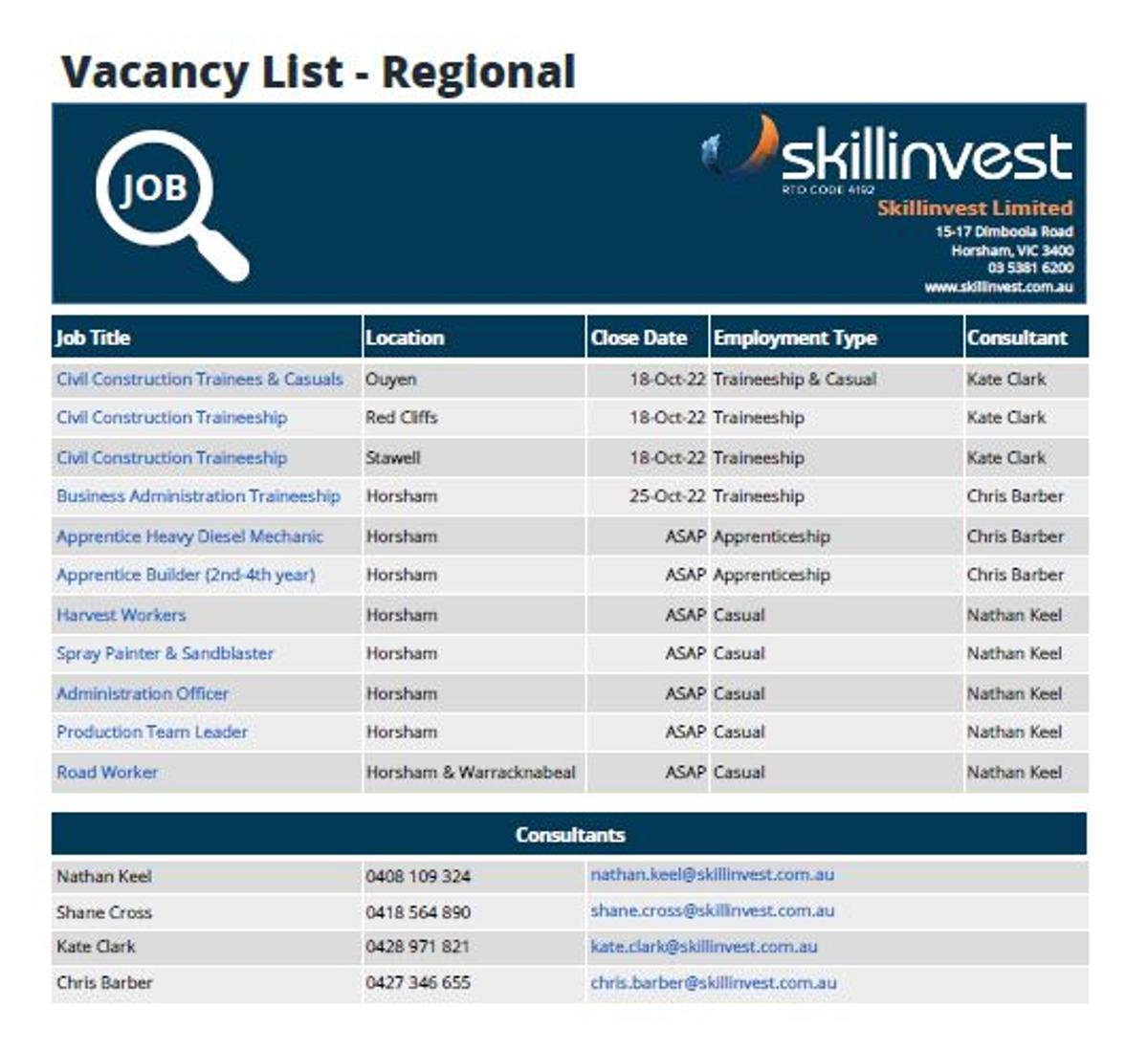Career & VET Report

Adam Frost
Farm Operations Manager
Circle H Farms
PO Box 44
Frances SA 5262
To Whom it May Concern,
School Leaver Casual Harvest Position
I am the Farm Operations Manager for Circle H Farms located at Frances. We are a mixed broad acre farming enterprise with harvest fast approaching.
We are seeking an enthusiastic and committed person who is interested in, and has experience with, farm machinery for a casual position during the harvest this year. The position will be predominately driving a tractor with a chaser bin attached to transfer grain from the harvester on the run back to either a field bin, mother bin or trucks. In addition to this, from time-to-time other general harvest duties will be required as well.
We are seeking someone who has a fantastic work ethic, is punctual and reliable and who has had some experience with operating machinery.
If you have anyone in mind, would you please pass on our information for their perusal. We would be most grateful and welcome their expression of interest. Alternatively, please advise any interested person to forward their cover letter with CV attached to our email address admin@circleh.com.au or adam@circleh.com.au.
I look forward to their call on my mobile number 0429 783 212 and would be happy to discuss the position in more detail with them.
Kind Regards
Adam Frost
Farm Operations Manager
Circle H Farms
Careers Report
Careers & Jobs
VET in Schools
Students doing VET courses on 2023 will have an induction day in Horsham and Longerenong on October 26. Permission forms will be sent home early next week. Note: Students doing Furnishings at Horsham College will not be required to attend on this day.
University offers and your options explained
For those of you planning on heading off to university, or for parents with children heading off, the wait for your ATAR results is nearly over and the next chapter of your lives is about to begin.
Hopefully your exams will go really well, your ATAR score will be what you expected (or better) and you’ll get an offer for your first preference. But if that’s not the case, you’ve still got time and options on your hands, so don’t stress. Check out our offers flowchart on our website, which could be helpful if you need to reassess what to do after the main round of offers are over.
Changing Preferences
If you’re still struggling with some aspects of changing preferences and the offers system, you can download our apply to uni guide here. Alternatively, you can contact your tertiary admissions centre (UAC, QTAC, VTAC, SATAC, TISC or UTAS) directly for more advice. There’s loads of information on their websites or give the future students team a call.
If you’ve applied to a uni via direct entry, call their admissions team for some information about your options and what to do next.
If you’ve applied to a uni via direct entry, call their admissions team for some information about your options and what to do next.
Top Tips to Remember
- If you get an offer (even if it’s not the one you’d really like), you can accept it so that you have it banked, then withdraw from it later if you receive another offer that suits you better.
- You can accept as many offers as you like, then choose the best option for you.
- Make sure that if you’ve accepted multiple offers, you check the census date, make your decision and let the universities know if you’re going to withdraw before that all important date. Otherwise, you could end up being enrolled on more than one course and at multiple universities, then you may have to pay all the fees.
- When you have decided on the offer that’s definitely the right one for you, the university should let you know all the details about how and when to enrol. So be sure to check your nominated email address that you supplied during applications. If you’re unclear about anything, give the admissions office at the university a call and the staff will be able to help you out.
Good luck and best wishes from all the Study Work Grow team.
Resources
9 Study Tips for Term 4
Term 4 is that last long haul before you’ll be rewarded with summer break and Christmas – that’s worth getting excited about.
It also means exams, reports and preparing for next year. If you’re in Year 12 with finals coming up, you might be feeling the pressure more than ever. Hopefully you’ve already started revising, but if not don’t stress, there’s still time.
Perhaps you’ve been putting it off because you’re not sure where to start or it just feels completely overwhelming.
If you haven’t already started, now’s the time to knuckle down.
Everyone is different, right down to the way that we learn and study.
- Perhaps you’re a visual learner who needs to pictures, images, graphs and diagrams?
- Does recording your notes and listening to them over and over really help? In which case you’re an auditory learner
- Or are you a verbal learner and who retains more when you read material? Whichever way you learn best, work out what it is, come up with a realistic schedule, then most importantly of all – stick to it.
If your goal is peak productivity, retention, and some of the zen that comes from feeling confident you know your stuff, here’s a few study tips that could help you to get started.
1. Get into your groove
Nope, we don’t mean put down your study notes and dance around your bedroom.
We’re talking about finding the best styles and times for you to study that give the maximum results.
When it comes to revision time, routine is a great way to get the most out of your study sessions without wearing yourself out.
Whether that’s half an hour when you get home from school and then some exercise, followed by another hour and a half in the evening, then do it. If it’s getting up at 5.30am and studying for 2 hours, do it. Work best in your free periods at school in the library? Great, schedule it in at every opportunity. Perhaps you’re a night owl and find that hunkering down for an hour or two in the evening works best for you (just don’t stay up all night and jeopardise your sleep).
Turn your preferred schedule into a habit. You’ll give your body and mind chance to settle into the rhythm and you’ll hopefully find it easier than studying randomly.
2. Focus on one thing at a time
Are you secretly confident that you’re a multi-tasking guru and that a smartphone, tablet, laptop, music and social media going all at once just make you ‘awesome’? You’re not alone, many of us think the same.
In reality though (and there are countless university studies to prove it), we’re actually far less effective when we’re juggling multiple things at once. So turn off social, put your phone in a drawer and focus on the task in hand.
Ideally don’t push yourself to focus for long periods – instead, find your sweet spot. You might study hard for 30 minutes & do something else for 10 – check your phone, listen to some music, get some exercise or have a drink & a snack. Then sit back down and focus for another 30 minutes.
If you’re easily distracted and “forget” to get back to studying you could always set alarms to keep you on track.
If you can study for longer in one period then great, go for it. Find what works for you and helps you focus.
3. Check the syllabus
Think that sounds like a yawn fest? Well the secrets to getting good marks are all right there.
If you understand the syllabus and the expectations for each subject, it will be easier to focus on studying the right things, rather than just studying everything in the subject textbook.
Another advantage is if there’s a gap in your knowledge, you’ll find out now rather in the middle of an exam. It’s a great way to make your study more effective and it will feel a whole lot less overwhelming.
Syllabus = important stuff, textbooks = everything stuff.
Especially if you’re unsure where to start revising, this could help you stuck in and get ahead faster too.
Remember to speak to your teachers, they’ll help you access the right information and make sure that you understand it, they want you to do well.
4. Become a note-taking ninja
If you’re not already an avid note-taker, now is an excellent time to boost this skill.
After checking out the syllabus and getting clear on what’s important, the next step is to make notes in a dedicated study folder. Making notes may seem old-school, but for lots of people the physical action of writing down information can help to cement it in your brain.
Keep that folder with you in all study periods so that you can refer to it and add new notes as you come across them.
It’s a great idea to highlight the important ones. Highlighting is another way to reinforce learning and help retain information. It’ll also help cut down on the volume of information to read through during the rest of your revision time.
Then, before each exam, you can go back through your folder and scan everything you need to know at once.
5. Practising self-care IS a study tool
Sound like mum talking? Sorry – but she does have a point. So looking after your body and your mind might not help you ace exams alone, but just like a top athlete, racing car driver, or brain surgeon – if you’re in top condition, then you’re going to be able to perform at your best.
Staying up late and then drinking heaps of energy drinks and coffee isn’t the way to succeed, no matter how ‘cool’ it might seem.
You need to get back to basics. Sleep (8-10 hours a night). Drink 2L of water a day (at least). Exercise (yeah!). And lastly, eat good food my young Padawan.
6. Practise, practise, practise
The thought of sitting your exams can be daunting for most people, and our bodies have sneaky ways of reacting to stress.
Do you feel nauseous, or have gut churning sensations in the lead up to exams, feel anxious, can’t sleep, have low energy or suffer with headaches? Or do you feel fine up until you sit down and turn over the paper then freeze and panic you have forgotten everything?
They’re completely normal reactions (thanks biology). So, how can you feel better about going into exams and make sure that all your hard work pays off when you start writing?
The simplest way is practise.
Doing things repetitively not only helps us learn, it also gives us confidence and can help combat those pesky stress symptoms.
Find some practise exams online, or ask your teachers to provide you with previous years exams, and incorporate answering them as part of your revision strategy.
Once you’ve done a few you’ll start to feel more comfortable and you could even introduce time limits, just like in a real exam scenario.
Familiarity with the kinds of questions you might get asked and the layout of the exams will set you up for success.
7. Check off some goals
Staying motivated through a gruelling schedule of school, study and sleep is hard.
Having something rewarding to look forward to can make it heaps easier to stay on track through the months ahead. For some, it’s the school formal or Schoolies (stay safe, OK?). And for others, it’s a gap-year exploring new horizons with just a backpack. Whatever it is for you, make sure it’s something that you really want and can keep focused on.
Long term goals should be the ultimate reward, but consider setting some short term goals too. For example, if you stick to your study schedule all week then how about a trip to the movies or just hang out with friends at the weekend? It could even be a little treat at the end of a study session before you hit the hay (and even though you’re looking after yourself, it doesn’t always have to be healthy).
8. Every little bit counts
If you lead a super busy life and you’re struggling to schedule in big study sessions every day, don’t be discouraged. Doing a little each day adds up to a whole heap at the end.
Conversely, if you don’t study every day, the little study periods you missed will add up to a lot you haven’t done.
You’re in charge here – which option will you go for?
9. Have faith in yourself
You’ve got this! Get your revision schedule organised and get going.
You’ve been at school for 12 years – it’s been an intensive learning curve and you’re almost at the end. Just one more hurdle to go and you’re off into the world to do your thing.
You’ve done heaps of exams before right? And you’re OK – you’ll be OK after these ones too.
Remember…
All in all – VCE or end of year exams DO mean a lot for your future. But they’re not the ‘be-all and end-all’.
Plenty of famous and amazing people who’ve greatly succeeded in life totally sucked at school and especially at exams. And even if you do fail, you can always go and do it again. So just chill, focus, and do the best you can.
Is Your Resume Summer Ready?
Before you start applying for jobs, it’s a good idea to make sure that you have a resume ready to go and that it’s up to date and that’s going to appeal to potential employers.
Getting your resume summer ready
If you already have a resume, but you haven’t looked at it since you last applied for a job, or you were nagged to get one sorted – it could well be due for a refresh.
- Check your contact and personal details are correct
- Add in any recent jobs you haven’t listed yet (including voluntary and community work)
- Update and skills, awards, achievements that you’ve accomplished lately
- List a couple of hobbies – the more relevant they are to the jobs you’re looking for the better
Take some time to review your skills and attributes section too.
Don’t forget that if you’re applying for a particular job, it’s a good idea to edit your CV to reflect what the employer is looking for. Never make things up, but it’s amazing how a little re-wording could make you more appealing as a prospective employee.
Creating a resume
If you don’t have a resume and you’ll be applying for your first job, no problem, you’ve got some time to prepare one.
Remember to include:
- Your name, age and contact details
- Education details, including the names of your schools and a list of subjects you’ve studied
- Any other jobs that you’ve had, including volunteer work or work experience
- A list of your skills – don’t be shy
- Awards or achievements you’ve received
- A couple of your hobbies and interests
Keep it brief, simple, honest, and easy to read.
These blogs “It’s all about the resume” and “Create your resume” have a few more tips and ideas.
Or head over to the Super Simple Resume Builder to get your CV whipped up in no time.
Customise the details
Your resume and cover letter will what gets you through the door and into an interview, so you’ve got to make them relevant and stand out.
If you’re just planning on going around to businesses handing over your resume, keep it short and sweet. It’s still worth writing a shiny cover letter too, just a few sentences letting the business know why you’d be an amazing addition to their team.
Applying for specific jobs? You’ll need to address skills or other criteria listed in the advert (remember, for entry level jobs the bar shouldn’t be set too high, so don’t be afraid to blow your own trumpet).
If you really don’t think you have many of the skills or experience they’re looking for, but you’re still keen on the job – say that in the cover letter. Tell them you’re really keen to learn. It could make a difference.
Grandshake Virtual Work Experiences
Grandshake offers a ton of awesome Virtual Work Experience programs for young people across Australia aged 14-19. These programs are a great way to get a taste of your dream career, all from your own home. And they help you learn some valuable skills along the way as well.
The programs run all year, during school and the holidays, so you can sign up to start at any time. The programs typically run for four weeks, with a 2-4 hour commitment per week. Best of all, they’re totally free.
Take a look at some of the programs you can explore:
Communication and Sustainability Cadet
Kick-Start your Farming Future
If you’re 18-25 and looking to start a career in a meaningful and exciting industry, an AgCAREERSTART gap-year could help you gain skills and knowledge to grow the farms of the future.
Over 10-12 months you will live in an exciting regional location, earn a nationally recognised qualification and build life-long industry connections.
- Get hands on experience
- Increase your confidence
- Work outdoors and discover rural and regional Australia
If you’re thinking about a future in Agriculture or just fancy seeing what’s out there in your Gap Year, this could be a great way to go about it. Find out more on the website https://agcareerstart.com.au.
Applications for 2023 close on October 18 2022.
Summer Season Jobs at Thredbo
Thredbo is Australia’s best snow resort and premier year round adventure destination. Open 365 days a year, they are home to the country’s longest ski runs, the country’s only lift-accessed mountain bike trails and the finest alpine hiking trails, showcasing the best of the Australian Alps.
A summer season in Thredbo is unforgettable, making every moment sparkle for our guests while enjoying Australia’s Alpine Playground.
Whether you’re looking for a career or a summer break, Thredbo offers a range of roles and shifts to suit everyone.
Want to know more about the jobs on offer, perks or the recruitment process? Head over to their page https://www.thredbo.com.au/about-thredbo/jobs/ for all the information, and get your applications ready.
Mrs Heffernan, Careers Co-ordinator



